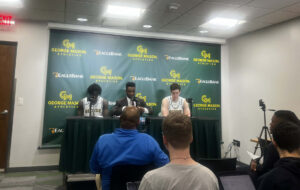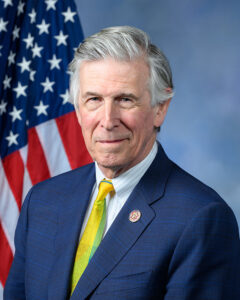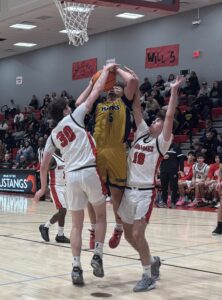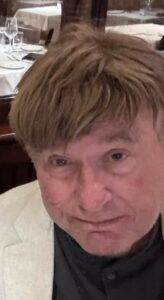By: Martha Clark Franks
Loving Connections: a eulogy delivered at the memorial service for Charlie Clark on December 16, 2023.
Charlie was magnificent.
Certainly I thought so, growing up here in Arlington. He was my admired older brother–tall, handsome, popular, funny, athletic, and really smart. He seemed to be always at the center of things. I know that lots of you have great stories about Charlie’s humor, kindness, generosity, canniness, and strong—very strong–opinions. I’m looking forward to hearing some of those stories, having benefited from (and contended with) these parts of his character all my life. But before we get there, I want to talk about what underlay them, what made him so remarkable, and how things unfolded for him because of his qualities of spirit. He had a center that took him from the childhood we shared into exactly the life he wanted. It was wonderfully done, a magnificent success.
Charlie cared about who people are and how they make communities. Our whole family loved ideas and books but this love took us different ways. For Charlie, the great study was people. All his life he was loyal to connections, honoring and holding on staunchly to family, to friends and to the places he had known, remembering and telling stories about how people had made those places important and interesting.
His sense of connection to family showed when, before he chose McGill University as his own place, he began college at the University of Oregon and got to know our father’s side of the family. Our father had seemed to leave his family of origin behind as he pursued a career with an international reach at the CIA. That bothered Charlie. He wanted to reconnect. Later he formed ties with our mother’s side when he happened to drive by a sign for the Saunders family’s annual pig roast in southern Virginia. He tracked down the Saunders, was recognized as part of the family and then attended the pig roast for many years, often in the company of our mother. She also had moved away from family and, through Charlie, reconnected with people she loved. As the generations turned, Charlie was the one who, together with his wife Ellen, took over the hosting for holidays and visits. My brother Tom, our cousin Anne and all the rest of us gathered at Charlie and Ellen’s house to mark the events of our lives. We were just the satellites, though. The heart of Charlie’s love of family was Ellen and their daughters Elizabeth and Susannah. Here were the deepest connections, deeper than any separation can touch. As a father, Charlie kept faith with a conscious choice to be entirely present for his daughters’ lives, to see things as they saw them and to care as they cared, applauding triumphs with gigantic pride and ready to sympathize with setbacks. What a core of love he made there! Or, rather, all of them made together, later welcoming Elizabeth’s husband Evan, Susannah’s husband Frank, and grandchildren Caroline and Patrick. Their house was a place of hospitality, of talk, laughter, arguing and music.
As for friends, the house itself was a testament to Charlie’s sense of connection. It had belonged to the family of his friend Peter Kwass, with whom he traveled for a gap year in Europe in 1971, described in one of his books. It mattered to Charlie that people he cared about had lived in that house. But I doubt that I have to persuade anyone here of how much Charlie valued friends, old and new. He was the one who held people together. He loved to remember and to honor everyone he had known, making contacts, telling stories of growing up together and taking care that we all knew what had become of each other. He was present at reunions and a big part of the Yorktown Hall of Fame. He had a strong sense that everyone he came to know along his way was part of who he was and he of them. He paid all of us the compliment of meeting us on our own terms, appreciating us, curious about our histories and asking his journalist’s questions.
Charlie’s appreciative curiosity showed in his career, underlying the professionalism that he brought to getting things right and to seeing people both sympathetically and clearly. He had always known he wanted to be a writer and, early on, the writing took the form of journalism. Maybe some of you remember his column in the Yorktown High School paper, the Sentry, practice for what would come later. He worked on the McGill paper too and then landed a job at Time-Life books, where he got good at nailing down research and also developed a feeling for the sweep of history.
From there his journalism career took him to different kinds of stories. He worked for the Congressional Quarterly, gaining an expertise in governmental matters, the Washington Post, where he produced editorial opinions, among other reporting, and several other publications, each with a different focus, which appealed to his lifelong curiosity. His last full-time journalism job was as a senior correspondent at Atlantic Media’s Government Executive Media Group, in the course of which he was sometimes interviewed on TV. I was teaching in Beijing, China for part of the time that Charlie was in this job. I proudly showed off my brother the Talking Head to my Chinese colleagues and students, having smuggled the video through censorship.
During retirement Charlie continued the work from which perhaps some here know him best, his columns on the history of our home community of Arlington. In his years as the “Our Man in Arlington” columnist for the Falls Church News-Press he told stories of all sorts of connections, personal, business, social, entertainment, academic, political, religious—all of the ways that people relate to each other. He loved working with the Arlington Historical Society and his columns became several books.
Then he went deeper into Arlington’s past, finding wider connections, when he wrote a biography of George Washington Parke-Custis, the builder of Arlington House. There are a zillion biographies of Parke-Custis’ adoptive father George Washington but Charlie wanted, I think, to report on the web of family and friends who made up the world around the great name. These people are usually treated as background characters. He gave them their due as important in their own right.
Charlie’s final book, published just days before the onset of the terrible illness that took him so suddenly from us, is a biography of a different kind. He wrote the life-story of the local paper in which his columns on Arlington had appeared, the Falls Church News-Press. The book is journalistically straightforward in style, so much so that you might not at first recognize it for what it is — a love letter from Charlie to local journalism. It describes a local journal supporting and being supported by its community. It makes a reader feel how fantastically important that exchange of support is. That was who Charlie wanted to be. That was who he succeeded in being.
I have fulfilled, I hope, my task of outlining my brother’s personal and worldly path. Now I want to return to how that life flowed from who he always was. I was surprised to hear that Charlie had chosen to have sung at his memorial a church hymn that we sang as children, “I sing a song of the saints of God.” He was not a church-goer and the song is simple and young. It seemed odd that so sophisticated a person would choose it. The more I think about it, though, the more his choice moves me, as showing something central about him. The song names a range of who people can be, doctors, soldiers, shepardesses, and says that anyone, from any place in life, can be a saint. I think Charlie understood from this song that a saint is someone who lives all the way into their whole distinctive self, from wherever they are. He was interested in how different we all are. He valued and enjoyed those differences. I like it that he felt sure that whatever divine power there is in the universe values and enjoys our differences too.
His choice of this song moves me for another reason. The song must have found its way into Charlie’s heart when we were small children, living in him vividly enough to be chosen for this memorial sixty-some years later, when he was thinking about his death. Charlie, more than anyone I have ever known, was sensitive to music. He had it in his bones, always. Music had an urgency for him that was immensely strong. I remember when the Beatles came to America and Charlie, eleven years old, caught the fire. This was something that belonged to him, something that our impressively intellectual parents did not get. He got it, he could feel it, he could tell that it was important. He taught himself to play the piano and the guitar. He organized bands—the Doo Ron Rons performed here in the Yorktown auditorium half a century ago, sporting slicked-back ducktail haircuts and singing parodies of popular songs. His love of music merged with his inherited intellectual bent and his journalistic training to become an encyclopedic knowledge of music, music history and the human stories of musicians. A soundtrack was always playing in Charlie’s house and he was the DJ. He would stop in the middle of a conversation to put on a song that some comment or argument or memory or joke had made him think of. I suspect that there was a soundtrack going on in his head wherever he was, adding feeling and color to everything he saw and thought.
There is an endless amount more to say about Charlie’s life. I haven’t talked enough about the jokes, which were never far from him, especially around his grandchildren. But, except for one more thing, I will stop here and yield the floor.
Some of us spend lots of our lives not thinking about how fragile we are and how fragile are those we love. Charlie and I fought, celebrated, argued, shared, lost touch, got back in touch, laughed, sang, enjoyed each other, snapped at each other and often treated each other as background characters.
All that is inevitable, whether with family, friends, or colleagues. Now, though, that my comfortable un-thinking has been overturned by the abruptness of losing Charlie I am made to see, as if it had been hidden from me, how complicated, wonderful and even beautiful he always was.
It wasn’t hidden. It was there from the beginning and grew greater as he grew.
When Ellen called me to say that Charlie had died she talked a little about how the disease had taken him. Everything had shut down, she said, but his heart kept beating for a long time. Then she added: “he had the strongest heart.”
Yes, he had the strongest heart. Really, magnificent.
Thank you.














